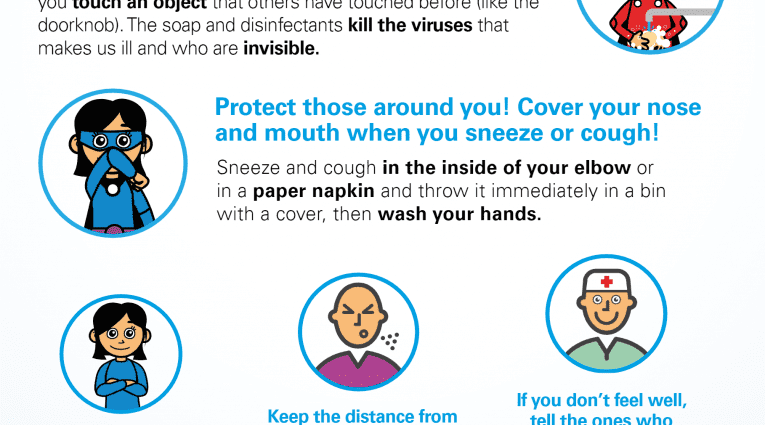ינהאַלט
- Coronavirus: before 7 years old, children do not need to know everything
- Coronavirus: from 8 to 15 years old, help the child to process the information, to put it in perspective
- In video: Teach him to wash his hands on his own
- אין ווידעא: קאָראָנאַווירוס: טאָן די באזוכן און אַקאַמאַדיישאַן רעכט פאָרזעצן צו צולייגן בעשאַס קאַנפיינמאַנט?
This time it is there, the Covid-19 coronavirus has settled in France. As a result, it is now at the heart of the news and in all adult conversations. How to talk to your child? For Florence Millot, psychologist for children and adolescents in Paris, we must ask the question of the relevance or not of talking about the coronavirus to your child.
Because, surprisingly as it sounds for adults, children do not feel and perceive things the same way.
Contacted by us, Florence Millot explains to us that before the age of about seven, the child is enough “זעלבסט-צענטערעד”. Apart from his daily life with his parents, his classmates, his school, the rest matters little, if at all.
"איךThis is something invisible. We are not in a direct event such as an attack where ‘bad guys’ could come and attack them”, Explains the psychologist. Also, if young children now know the word “coronavirus”, and may have heard of it at school or in the news, there is no associated fear. Unless one of the parents is in fear himself, and passes it on in spite of himself to his child.
From her own experience, Florence Millot currently sees few children who express a real fear in the face of the coronavirus. “If his boyfriend is in the hospital, the child will be sad for his boyfriend but will not necessarily invent a whole world like an adult could do, he who anticipates everything”, She adds.
For young children, it is therefore not necessarily necessary or desirable to go into detail, or even broach the subject if the child does not speak about it himself. This would risk creating fears in him that he did not necessarily have before.
On the other hand, if the child (or his entire school) is placed in quarantine for 14 days, he will simply be explained that, as in the case of measles, rubella, chickenpox or gastroenteritis, We stay at home “the time the virus spends”, Advises Florence Millot.
Ditto for the adoption of the “barrier” gestures recommended by the authorities (washing hands, sneezing in the elbow, disposable tissues): we simply explain to him that a virus is circulating, as in a period of an epidemic of gastroenteritis or flu, and that a few simple steps can keep the virus from spreading further.
"ווען זיי האָבן צוטריט אויף זייער אייגן צו אינפֿאָרמאַציע, געזעלשאַפטלעך נעטוואָרקס, פאַלש בילדער, קינדער קענען האָבן פירז, ווייַל פון דעם געדאַנק פון ינוואַזיע.”, Warns the psychologist.
At this age, the important thing is help his child to sort through the information he receives, to ask him if he wants to talk about it, if something scares him.
We will be able to put this new epidemic in perspective, by giving him examples of other particularly contagious viruses, by evoking the other major epidemics in history that he was able to study at school (seasonal flu every year, but also SARS, H1N1, HIV, even Spanish flu and plague, depending on the child’s age). The goal being to get out of this “media fixette”Which can be a vector of anxiety and paranoia, and to remember that a virus also ends up disappearing, by dying. “By contextualizing, we realize that life goes on”, Emphasizes the psychologist.
"There is not much to explain to the child, except that this virus is transmitted by hand-to-mouth contact, and that it is therefore necessary be careful to wash your hands well, etc. We can just explain that as it is a rapidly spreading virus, we adopt simple measures to protect ourselves, and we stay at home if necessary”, Adds Florence Millot. Especially since children seem more resistant to the virus, perhaps because of more efficient immune defenses.
The need to talk about it when a classmate is affected
If a classmate is hospitalized due to the Covid-19 coronavirus, then it is important to take the time to sit down with your child, and to talk about it with him. He will undoubtedly be touched to know his boyfriend in the hospital, but as he would be in the case of another illness. It will then be a question of reassuring his child, by telling him that his friend is well taken care of, that there is the possibility of treatment, and that we do not systematically die of the coronavirus, far from it.
In general, the psychologist advises not to explain everything or detail everything to the child. An anxious parent who will tend to stock up on food or obtain hydroalcoholic gels should not feel obliged to explain his approach to his child. “On the one hand, it doesn’t necessarily interest him and he probably wouldn’t have ticked if we hadn’t told him anything, and on the other hand, it risks cultivating fear, adding fear to fear.”, Warns Florence Millot.
If a child expresses his fear of having the coronavirus, it is best to reassure him by telling him that if he is infected, everything will be done to treat him, especially as the severe forms of Covid-19 fortunately do not concern the majority of people affected.










